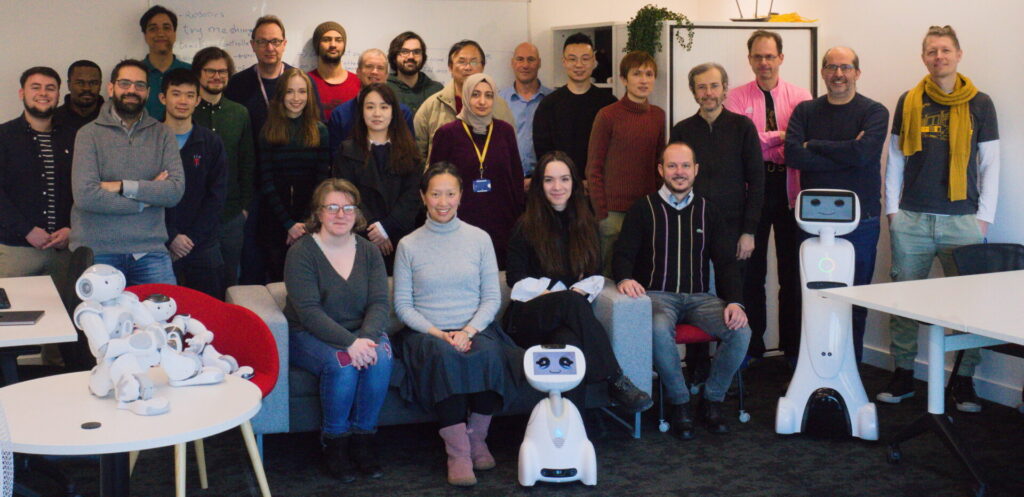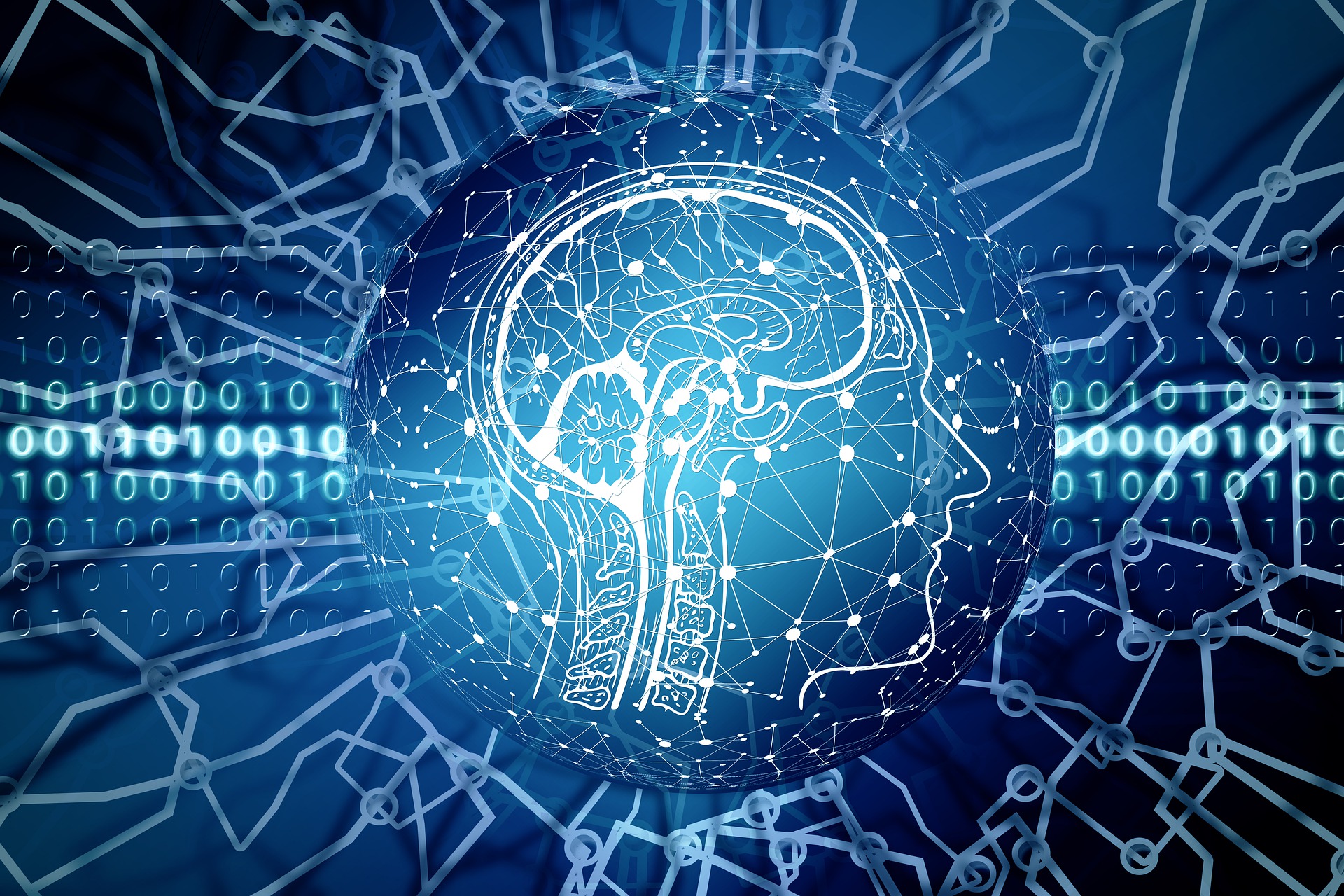Welcome to our dynamic and interdisciplinary research group, where we delve into the exciting realms of artificial intelligence (AI), machine learning and data science. Our research group comprises experts with diverse backgrounds and extensive knowledge, driving innovation and pushing the boundaries of these rapidly evolving fields.

Picture of the research group Jan 2024
Contact: Peter Rodgers
We take a holistic approach to AI and data science, exploring both the theoretical foundations and practical applications. Our research interests span a broad spectrum, from the development of novel algorithms and models to addressing real-world challenges across various domains. By integrating cutting-edge technologies and methodologies, we aim to advance the state-of-the-art and contribute significantly to scientific knowledge and societal progress.
Our areas of expertise include:
- Machine Learning: We work on developing advanced learning algorithms, including deep learning, reinforcement learning, and unsupervised learning, to solve complex problems and enable machines to learn from data effectively.
- Artificial Intelligence: Our research covers a wide range of AI topics, from natural language processing and computer vision to autonomous systems and robotics, aiming to create intelligent systems that can perceive, reason, and act autonomously.
- Data Science: We specialise in data analysis, big data processing, and data visualisation, applying statistical and computational techniques to extract meaningful insights and make data-driven decisions.
Our group is dedicated to fostering a collaborative environment, encouraging cross-disciplinary research, and engaging with industry partners. for example via funded KTP projects or consulting. If you would like to work with us, you can contact a relevant member of staff directly, or alternatively, visit the University Business and Innovation Gateway. We also welcome enquiries from students who are interested in doing a PhD with us. We believe in the power of AI and data science to transform industries, enhance human capabilities, and address some of the most pressing challenges facing society today. Our expertise includes the following topics:
Machine learning
Marek Grzes, Alex Freitas, Fernando Otero, Daniel Soria, Zhongtian Sun.
We develop algorithms to enable machines to automatically recognise patterns in data in supervised and unsupervised settings. We are also interested in reinforcement learning.
Explainable and Trustworthy AI
Alex Freitas, Fernando Otero, Elena Botoeva.
State of the art machine learning algorithms are most commonly black-box models. This means that we cannot know why an algorithm has come to a particular decision. This prevents their application in domains where it is important to justify how decisions have been made, as for example in finance or medicine. Our group researches novel algorithms that perform well and are explainable.
Computational neuroscience/brain-computer interfaces
Palaniappan Ramaswamy, Zhongtian Sun.
We use machine learning and advanced statistical methods to analyse physiological signals (such as EEG data) to understand the brain. These can then be used to understand how the brain works, but we also build systems that allows computers to be controlled mere by thoughts.
Graphs/visualisation
We find novel methods to automatically visualise complex information, use graphs to represent semantic information and use data mining and graph theory to better find hidden patterns in data.
Computational Creativity
AI can be used to create new, interesting artefacts and art. We explore what it means for a computer to be creative. Our research also addresses how human creativity can be understood and modelled computationally. We have particular interests in music informatics, LLMs, language-based creativity and creativity theory.
Smart environments and IoT
Christos Efstratiou, Chee Siang (Jim) Ang, Palaniappan Ramaswamy.
The proliferation of smart sensing and IoT technologies opens new opportunities and challenges for the development of novel intelligent systems with real-world applications. Working with real-world data, there is a need for the development of novel data analytics and machine learning techniques that can process large-scale datasets form sensors and smart devices and infer knowledge about systems performance or human behaviour. Applications can range from data analytics for healthcare, smart cities, and smart buildings, to interactive museums and performing arts.
Applications of machine learning and data science to healthcare
Alex Freitas, Giovanni Luca Masala, Chee Siang (Jim) Ang, Christos Efstratiou, Palaniappan Ramaswamy, Daniel Soria, Zhongtian Sun.
Data science and AI can be used to find better treatments for diseases, new drugs or improved care. We have a strong portfolio that ranges from machine aided diagnostic, assistive living and smart environments, to the use of virtual reality to improve the lives of Alzheimer patients. We have expertise developing Computer Aided Detection systems for radiological images and in biomedical data classification. We have a long track record of working closely with health specialists to explore novel solutions that can have significant impact on the quality of care offered to patients.
Cognitive Robotics
Ioanna Giorgi, Giovanni Luca Masala.
In our Cognitive Robotics and Autonomous Systems (CoRAS) lab, we research how machines can be programmed to work collaboratively and productively with one another and alongside humans. Our research in cognitive and developmental robotics is aimed at designing intelligent behaviour in robots, including high-level perception, motor, language and cognitive skills. We are working towards social and assistive robotics, mobile robotics and human-robot interaction.
Natural language processing and understanding
Anna Jordanous, Marek Grzes, Ioanna Giorgi, Giovanni Luca Masala.
We have interests in language processing, understanding and generation through a breadth of techniques based on probabilistic modelling and neural networks. We study state of the art transformers, language models and cognitive architectures inspired by cognitive science, linguistics and psychology. Our research covers mono (English language) and multilingual approaches.
